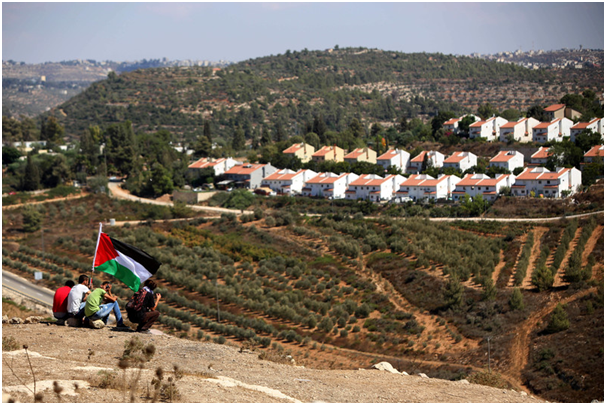Palestinians Worse Off Than Ever as Israeli Settlers Numbers Soar, Says UN
Palestinians wave a flag against Israeli settlements in West Bank village of Nabi Saleh

Palestinians are economically worse off than ever before as the number of Israeli settlers on their land sets records, a new report by the United Nations trade and development agency UNCTAD reveals.
Israel’s longstanding restrictions on the Palestinian economy are to blame. But the situation has been made catastrophically worse by its ongoing blockade and devastating attack on Gaza last summer that killed more than 2,200 people, including 551 children.
Three full-scale Israeli military attacks on Gaza in the last six years, on top of eight years of blockade, have ravaged the territory’s infrastructure, destroyed its productive capacity, hindered any meaningful reconstruction and left the people poorer than any time in 20 years, the report states.
Unemployment in Gaza has reached 44 percent, the highest level on record, and is at 18 percent in the West Bank.
But UNCTAD says “the real depth of unemployment and the attendant waste of human resources” are even worse than the figures suggest.
Even before last summer’s Israeli attack on Gaza and the further deterioration in the economy, 3 out of 5 households in Gaza and 1 out of 5 in the West Bank were food insecure – meaning they could not guarantee a reliable and sufficient supply of affordable and nutritious food.
In the year 2000, just 72,000 people in Gaza were dependent on UN food rations. In May this year, that figure reached 868,000 – almost half the population.
The lastest Israeli assault on Gaza “effectively eliminated what was left of the middle class, sending almost all of the population into destitution and dependence on international humanitarian aid,” the report states.
UNCTAD estimates the direct costs of the destruction Israel inflicted on Gaza in its attacks in November 2012 and last year at $2.7 billion.
In a much publicized 2012 report, the UN concluded that if nothing changed, Gaza would be “unlivable” by 2020.
This latest report notes that things have only gotten worse since then.
Gaza is by any reasonable measure already unlivable. That, at least, must have been the conclusion of the hundreds of Palestinians known to have died – or been murdered – at sea trying to reach safer shores in Europe.
UN figures show that Israel is reaping billions of dollars in benefits from the export of goods and electricity to a captive Palestinian market. Israel bans virtually all exports from Gaza.
It has repeatedly destroyed Gaza’s electricity generating capacity while preventing the construction of new plants in the West Bank, forcing Palestinians to pay exorbitant prices for Israeli-generated power.
Israeli colonists, by contrast, are doing particularly well.
Settlers now outnumber Palestinians in “Area C” of the occupied West Bank, the report notes. This area, so designated under the 1993 Oslo accords, makes up 61 percent of the West Bank and remains under full Israeli military control, with no role for the Palestinian Authority.
It includes dozens of Palestinian villages and, according to UNCTAD, the “most valuable Palestinian natural resources.”
Due to Israel’s aggressive and unchecked colonization, there are now 341,000 Israeli settlers in Area C, compared to 300,000 Palestinians.
It is in this area that settlers subject Palestinians and their assets to relentless and sometimes lethal attacks, with more than 9,000 productive trees destroyed or vandalized in 2014.
The stark facts contained in the UNCTAD report underline that Israel is nothing less than an existential threat to the Palestinian people.
The report calls for an end to the blockade of Gaza and restrictions in the West Bank and for Palestinians to be granted their full rights under international law.
More donor aid, though urgently necessary to deal with the deepening crisis, cannot be a substitute for restoring Palestinian rights, the report concludes.
But the bureaucratese of an official report leaves some things unsaid.
The catastrophic situation in the occupied West Bank and Gaza Strip, it must always be recalled, is manufactured – specifically by Israel.
It is the direct consequence of the support and complicity Israel has received from international corporations, the European Union, certain Arab regimes and especially the United States.
President Barack Obama bears particular culpability – his administration has increased aid to Israel to record levels even as Israel has inflicted unprecedented violence and oppression on Palestinians.
The Israel-Hamas contacts, mediated by former British Prime Minister Tony Blair, to reach a long-term truce for Gaza that would end the siege, have reached a dead end, Middle East Eye’s David Hearst reported this week.
It is therefore more urgent than ever that Israel and its abettors be pressured and brought to account by all means available, especially boycott, divestment and sanctions.
(ELECTRONIC INTIFADA)



